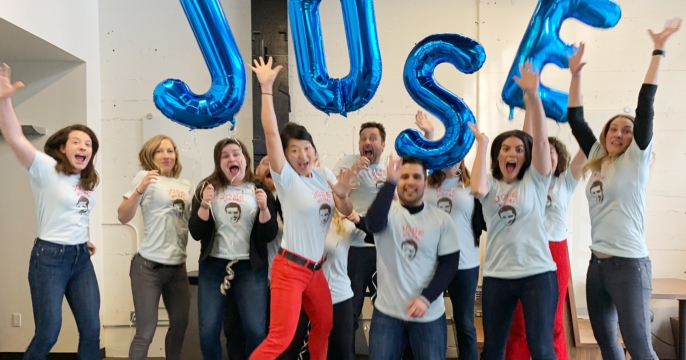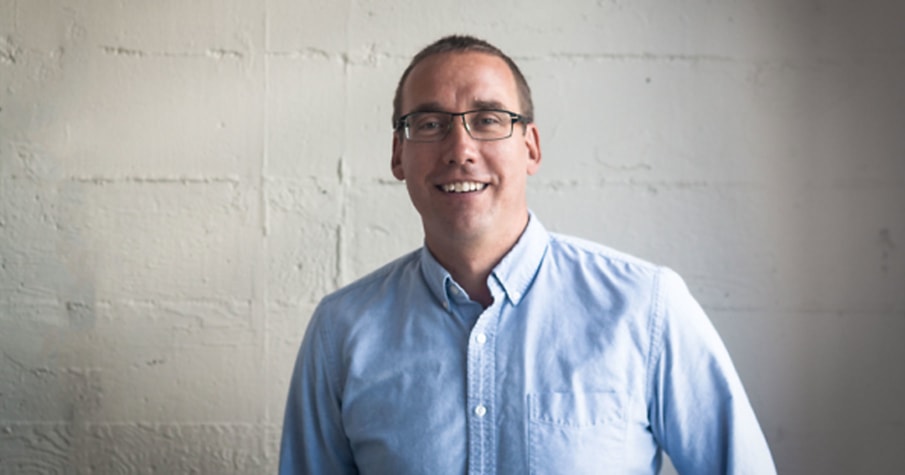
Why Employee Satisfaction Isn’t Enough
For years, the name of the game for managing people was employee satisfaction. With a changing labor market and higher employer standards, that focus is changing.

Our Accelerator Interview series, “Thinking Big” is our way of sharing insights from successful business leaders within the Kinesis community.
In today’s business environment, we spend a lot of time thinking about how to make ourselves more effective at work – from time tracking tools to meeting rhythms. Today, we’re excited to chat with Craig Thomas, President of Fully – a company that is taking a new approach to workplace engagement.
Fully provides ergonomic desks, chairs, and accessories for the modern workplace. In other words, they’re here to shift this thinking from what we’re working on, to what we’re working on.
Shawn: Hi Craig. Thanks again for sharing your insights and experience with the Kinesis Accelerator readers. Maybe you can start by telling our readers a little bit about Fully and your corporate mission.
Craig: Hi Shawn. Thanks for having me. Fully wants everyone to be active and engaged throughout their day so that they can create a better self, community, and world around them. Specifically, we sell chairs, desks, and other accessories that encourage movement in some typically sedentary moments of our lives.
We frequently get comments from customers about how a new desk or chair has changed their lives for the better by alleviating pain or increasing their energy levels. This is because when we are more active, the blood is flowing and we can be more engaged in what we’re doing. This engagement allows us to be more focused, creative, and effective.
Shawn: That’s a great summary. Fully has been around for more than a decade, but if I’m not mistaken your current brand identity is relatively new. I’d love to learn more about the decision to rebrand from the original “Ergo Depot.”
Craig: It’s certainly not something we undertook on a whim. In a close-knit company like ours, it is obviously a very big decision to change your name. For me (and I’ll take some liberty to speak for the team), the name Ergo Depot was ingrained in our identity – and the thought of changing it triggered an emotional response. Despite that, we realized and all agreed that our company, product, culture, and aspirations had all evolved beyond the name Ergo Depot.
Until the last few years, we did not design our own products, we selected the best products from other companies to sell (essentially an ergonomic “depot”). But since then, our company has changed a lot. David Kahl (our founder) and several others built an incredible culture, as well as a customer service and product delivery system.
So it actually hasn’t felt like a huge “rebrand,” because internally, we aren’t acting any differently or doing anything differently. It’s just a name that more accurately reflects who we are today.
Shawn: You actually bring up a good point – most of the time you hear the word, “rebrand,” people think in terms of new logos and colors. You guys went all-in and changed the name. Kinesis has helped a number of companies rename themselves over the years. It’s not something to be taken lightly, of course, but my team always relishes the opportunity. On the other hand, clients are often nervous to “take the plunge.” Do you have any dos and don’ts to share on what you’ve learned through the process of renaming the company?
Craig: The name has to fit you, even if it’s a little big when you first put it on. It’s been a journey for us to all come to identify with the name. It doesn’t automatically change the way you interact with each other, or the rest of the world. But when we talk internally about what we are doing, we talk about connection, being fully present, fully engaged, fully there for our customers and each other – being all in.
So what worked for us is that we weren’t trying to drive a culture change – the concept of Fully is something that we all already believed in.
Shawn: And now that you’re on the other side of the name change, what are some of the benefits you’ve seen?
Craig: I, for one, use it when I’m making decisions. “Is this Fully? Are we able to fully satisfy all of those things from a short- and long-term perspective?” Having our identity and mission is right there in our name has been incredibly transformative.
Shawn: Ok, I’m going to switch gears a bit here and talk marketing for small businesses. Fully is a growing company, but I’m guessing you all wear lots of hats. Tell us about Fully’s current marketing infrastructure, how you got there, and what’s next for the team.
Craig: As a company that does most of our business through e-commerce, we have to embrace that marketing has evolved – consumers are smart and have access to do their own research. So our marketing has been focused on how to best serve our customers.
First off, our customer service team is made up of the most caring, articulate, helpful people. Some of our best marketing insights come from our customers, and are captured by our customer service team. In fact, our marketing team consists of brand, outreach, social, and e-commerce folks – most of whom have grown within the company from customer service.
We focus on listening for customer needs and any shortcomings of our current offering – and our customer service team sits next to product development for that reason. When we heard assembly instructions were unclear, we produced an assembly video. And one of our most successful product launches in the last year was also generated this way.
As far as what’s next – right now we are working on getting our internal systems able to provide better data to understand what is happening today. That will allow us to continue to move fast as we grow.
Shawn: Yours is an interesting model in that you sell both directly to consumers (B2C) but also to businesses (B2B). You have an e-commerce component to your website, but I imagine you get corporate buyers and perhaps even interior designers as customers. How do you segment your customer base (assuming you do) and what are some of the lessons learned by selling to different audiences?
Craig: We’re committed to telling our story directly to end users. Our message is a human message, one that we feel resonates regardless of whether you’re working from home or within a traditional office setting. We’ve worked hard to make these products that used to be inaccessible to consumers more affordable by going direct.
That said, we’ve begun to segment our consumers and business channels. In both cases, they find us through the website – and either way, both customers want to understand exactly how our products will look and feel. For both segments, we have dedicated customer service experts who we train and have experience with their specific needs. In each case, it comes down to connecting one-on-one whenever we can.
Shawn: I was flipping through a catalog the other day and saw a sale for a sit-stand desk. We have standing desks at our office, and it seems to be a growing market. That said, it looks like there’s a lot of competition, with many me-too products. How do you differentiate, especially given that you aren’t manufacturing your own products?
Craig: We were founded on an iconic Norwegian chair called the HAG Capisco. It has a saddle seat and a small “t” shaped back that encourages you to move throughout your day. When our founder, David Kahl, discovered the Capisco, he loved it so much that he left his job (and it was a great job) to sell them out of his parents’ barn. Why? Because it fundamentally changed the way his body felt. Fast forward 12 years to today and if you ask every single Fully employee about this chair, you will hear a different tale of their relationship with it.
So we aren’t just picking products that check a box in our offering. We carry products that we personally love using. And when we find a better one, we replace the former. We aim to have the best products available for specific needs – so if a product meets a need, we get it to our customers. And if it doesn’t exist, we design it ourselves.
For example, our sit-stand desk (the Jarvis) was developed about 5 years ago and it’s been through more than 20 versions. It’s been the #1 standing desk on the most authoritative tech review site for 4 years running. We are very proud of the desk, but our product development team continues to look for ways to make it quieter, more stable, and better looking. David and the product development team pore through review sites and customer feedback to evaluate the best way to address shortcomings in the next version. It’s that attention to our customers that helps us differentiate ourselves – both from a product perspective, but also throughout all our business operations.
Shawn: Okay, last question. You joined Fully less than 2 years ago, moving from COO to President in a relatively short period of time. Tell me a bit about the conversations around that decision, and what advice you’d give to entrepreneurs who are looking to bring on executive-level talent.
Craig: When he hired me, David knew that he didn’t need another David – he was looking for a very specific kind of leader. We have different, but complementary leadership styles. So the conversation was around our desire for him to be able to be more focused on product, strategy, and culture – and my readiness to run all other aspects of the business.
The company hired me after experiencing significant growth, and frankly, I don’t know how David was holding it all together. But even under pressure, David and the team undertook a thoughtful, deliberate hiring process. It gave me a lot of confidence that this was the right fit.
After getting hired, David definitely hasn’t been hands-off – and just like any close relationship, it hasn’t been pretty every single day. We challenge each other and hold each other accountable. David has invested a lot of his time to transfer his vision for the company to me, and he continues to invest time with me every day. He’s committed to lots of open, honest, and immediate communication. As our partnership grows, we are learning from each other and growing as individuals. I think that’s important with any leadership hire or transition – that’s the advice I would give.
To learn more about Fully and their products, visit their website.
Interested in Fully's rename story? Check out our blog post about when (and how) to rename your company.
Get insights like this straight to your inbox.